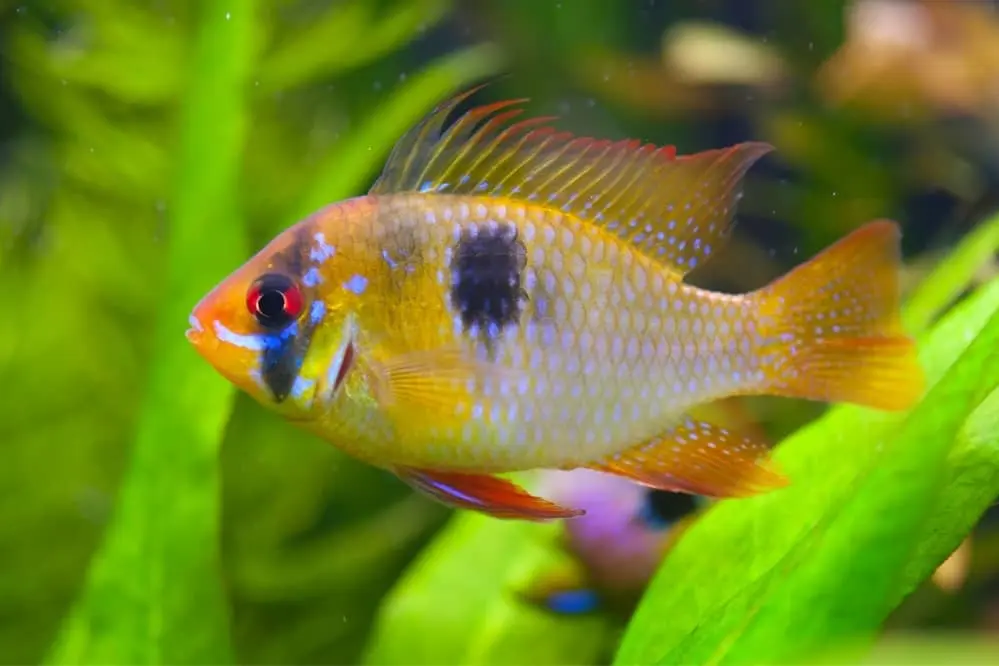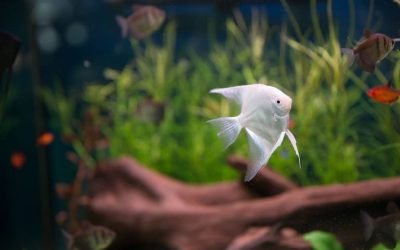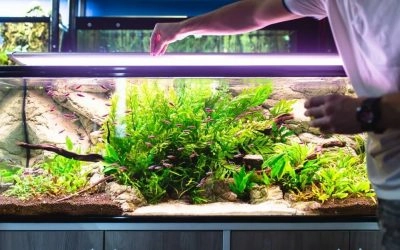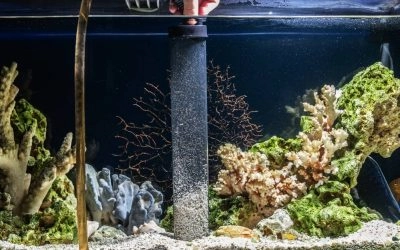What Happens if My Fish Touches the Heater?
Your fish will be fine if it just touches the heater but if the contact is prolonged, your fish can get burn by heater. However the chance of getting heater burn is very minimal but it does not mean it never happens. Typically your fish can get burnt
- if fish got stuck against the heater(between glass and heater)
- if fish choose to hide or rest on the heater.

Sign of heater burn on fish
Initially when fish get burnt by heater you have may not notice any changes in the behavior. Although injured, fish will swim naturally. This is the instinctive behavior of fish. In nature any sign of weakness attracts predators. In fish tank, it might feel threatened by other fish. So how can you tell if the fish has been burnt by the heater?
Look out for burn mark on fish. If it is recent burn mark, skin will appear opaque and gills will appear more transparent. Fish will be stressed due to pain caused by heater burn. They will remain motionless at the bottom of the tank. Depending on the severity of burn, the burnt skin will fall off after few days leaving a deep wound. This is very dangerous because this causes tissue of fish to be exposed to bacteria and other pathogenic agent present in aquarium water. Risk of infection is extremely at high at this stage.
If you don’t take immediate action, your fish may die within couple of days due to stress and infection.
Prevent heater burn on fish
You might consider taking out heater to prevent fish from accidental heater burn but unfortunately heater is a essential part of an aquarium setup. You need heater to maintain ideal water temperature for your fish through day and night. So, instead of discarding heater, you can try out the following options.
Aquarium heater guard
With heater guard, you no longer have to worry about fish touching the heater. Heater guard prevents not just your fish but also aquarium glass and decor from coming in direct contact with the heater.
Another added bonus of having heater guard is that it protects heater from getting cracked or broken. Although label durable, heaters do break. This usually happens when it gets hit by aquarium decor or when it gets thrashed by large energetic fish.
Always be wary of broken heater because it can kill all the fish in your tank.
Filter with built in heater
Filter with built in heater (canister or power filters), as name suggest serves following purposes.
- it filters debris such as fish waste and leftover food
- it convert ammonia present in water into nitrate
- it heats the water at the same time
When water flows back into the fish tank, you get warm and aerated water to breathe.
Heater Placement
To ensure the safety of fish make sure there is enough space around and below the heater so that fish won’t get stuck against it.
Fish also get heater burn when they use heater to hide and rest. To prevent it place plenty aquarium decor and plants inside the tank. These will provide safer option for fish to hide and rest.
Treatment of heater burn on fish
Fish skin mucus provide protection against pathogen infections. When fish skin gets burnt, their defense gets compromised. They can easily succumb to disease caused by pathogens due to weaker immune system.
Here are few approaches you can take in treating heater burn but if the fish is too badly burnt then regardless of what you do, it may not survive. In such case, it may be better to let it die then to prolong the suffering until it dies naturally.
Water Change
You can do 20% water change while monitoring the condition of burn mark. Continue the process until you notice improvement in burn mark. Always remember to keep ammonia and specially nitrite level low when you carry out water change.
Heal Naturally
If it is not a deep burn which is often the case, you don’t need to take any action. Mild burns heal naturally in couple of days. However if you want to speed up the recovery, you can net the fish and apply Povidone iodine, an antiseptic on affected area of fish skin.
You can also add water conditioner to your fish tank. This will protect your fish from secondary infection by adding artificial layer of mucus over the burn area. But remember not to add too much of water conditioner. Although it may not kill your fish, it is not advisable to have higher concentration of water conditioner in water. It creates imbalance in water quality.
Salt treatment
Salt ( non-iodized salt with no additives ) treatment is another remedy you can use for healing your fish. It prevents the risk of secondary infection and eases osmotic pressure on the fish.A note of caution, even small dosage of salt can kill live plants in your tank. It is also very harmful to scaleless fish species like corydoras and tetras. So, instead of adding it to your regular fish tank, use separate fish tank or bucket to treat injured fish.
For treating, use 4 teaspoon of salts (16.8g) and dissolve it completely in a bucket with 1 gallon of water taken from your regular fish tank. Dip your fish in the bucket for 5 – 30 minutes while carefully observing it’s behavior. If you notice any sign of distress, immediately put it back to regular fish tank.
Normally after salt treatment, it takes about a week for mild burn to heal. For deep burn, it may take couple of weeks.




0 Comments